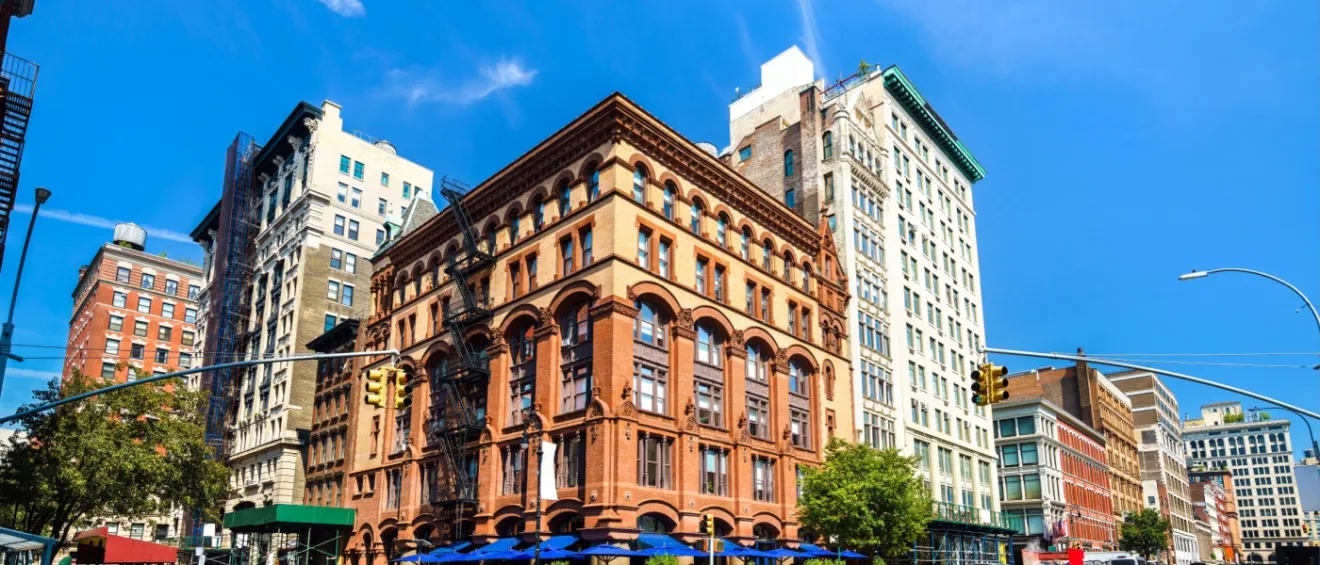Share this article:
After graduation, you’ll find yourself facing an important decision — where to move to start your career and enter your adult era. As a Gen Z, it’s not just the job opportunities that attract you, but also where you’ll find a balance between a good life and rewarding work. With that in mind, we put together this list of the best metros for Gen Z graduates to help you narrow your search.
For this list, we looked for the core values of Gen Z, including affordability, culture, social life, diversity, the environment and, of course, livability. The following ranking takes all of these into account by using five different metrics related to the youth culture and financial growth of cities. It’s combined with a proprietary composite index that attests to the livability of each destination, which looks at the socioeconomics of the metro; location and community considerations; and quality of life.
How did we determine the top metros for Gen Z graduates? These were the top metrics:
- share of Gen Z adults from total metro population
- share of highly educated Gen Z adults
- change in unemployment
- income growth
- job growth
- livability composite index
Ann Arbor, MI, crowned top metro for Gen Z graduates in 2025, Lincoln, NE, & Des Moines, IA, follow
Ann Arbor, MI, takes the first position as the best metro for Gen Z graduates with its college-town charm and competitive job market. Notably, with a top three rounded out by Lincoln, NE, and Des Moines, IA, we see the shift in Gen Z’s preferences from the large urban centers to more livable and affordable destinations.
When we look at the top 10, many of these metros are regional economic hubs with growing industries, including in tech, health care and research — such as Boston and Seattle. They’re also close to major universities, meaning there’s a steady influx of young people, cultural events and lifelong learning opportunities.
Some of the metros (like Lincoln, NE; Des Moines, IA; or Fayetteville, AR) also share a relative affordability compared to large urban centers, and that’s without compromising on quality of life: These are places that are clean; walkable; culturally active; and rich in green spaces, parks and recreational options.
Finally, you’re looking at metros whose citizens are civically active. There are tight-knit communities that offer a sense of belonging, and social connections are easy to make and maintain.
Top 10: Metros for Gen Z that blend affordability & opportunity in a nicely wrapped package
1. Ann Arbor, MI
- Best rank: #1 for percentage of highly educated young adults
Ann Arbor, MI, takes the top position as the best metro for Gen Z graduates, propelled to this rank by its impressive share of highly educated Gen Z adults (#1 among the cities we examined), as well as its young population (#3) and overall livability (#6). Home to University of Michigan, Ann Arbor has the college-town energy that fresh graduates still want with opportunities for lifelong learning and intellectual development, as well as access to academia or research roles.

Beyond the university, Ann Arbor has a growing tech and startup scene (supported, among others, by the SPARK incubator) and it’s close to Detroit, offering access to a larger job pool. Importantly, it’s a city where you don’t necessarily need a car to get around comfortably, and there is an added emphasis on quality of life (such as parks, trails and outdoor recreation), which supports Gen Z’s priorities of health and wellness.
The indie culture of the city, promoted by its young residents, as well as the strong, inclusive community, attracts many Gen Zers, who are also financially conscious and appreciate an affordable, high-quality lifestyle.
2. Lincoln, NE
- Best rank: #2 for livability, change in unemployment & percentage of Gen Zers
Taking the 2nd spot in our ranking is Lincoln, NE, a metro with a stable job market and the second-lowest unemployment change rate among the places we examined. Here, opportunities in government, tech, and health care abound, and the connection with the University of Nebraska-Lincoln means research and education careers are also an important option for young Gen Z graduates.

Furthermore, Lincoln ranks high in terms of livability (2nd place) and percentage of Gen Zers out of the total population (also 2nd), meaning this is an area where young people feel right at home in a community that fosters their well-being, stability and safety. Thus, with a growing arts scene and a strong infrastructure for commute and digital living, Lincoln, NE, has everything that Gen Z dreams of.
3. Des Moines, IA
- Best rank: #4 for livability
Although not a traditional college destination, Des Moines, IA, is a place that many Gen Zers might want to have on their radar for after graduation as it ranks 4th on our list in terms of livability. Of course, Gen Zers are generally early adopters, wanting to be present when the cool factor is developing. This applies to Des Moines’ local art scene, as well as its food and drinks culture, both of which are on the rise.

Plus, the city offers an urban vibe at more accessible prices, so it’s a space to grow and experiment, especially at the beginning of one’s career. In particular, the access to entry-level jobs in important fields like tech, insurance or finance might appeal to many young grads. Thus, in terms of quality of life, Des Moines is a place where wellness can be fostered.
4. Boston, MA
- Best rank: #2 for percentage of highly educated young adults
The Boston metro area is a place that many people choose because of the intellectual energy that is nurtured by the presence of more than 35 colleges and universities in the area, including big names, like MIT, Harvard, Northeastern and more. Even after graduation, many young people choose this capital of knowledge for the innovation and intellectual stimulation it provides, which is also demonstrated by its impressive share of highly educated young adults (#2 in our list). As such, those looking to launch their careers find a perfect home in Boston, especially in the fields of biotech and life sciences; finance; consulting; AI; SaaS; education; and academia.

Despite being such a packed area, Boston has a rather compact layout, so walkability is not an issue. Moreover, the top-tier infrastructure adds to the supportive environment that one can find in the city. Although Boston has a high cost of living and a very competitive job market, it’s a destination in which Gen Zs can invest in themselves and their connections, skills and future opportunities.
5. Portland, ME
- Best rank: #1 for livability
Portland ranks in our analysis as the most livable metro in the country by offering a coastal and creative lifestyle at affordable prices, in addition to an inclusive culture and an authentic vibe that feels indie and artsy. The area also sees one of the highest percentages of highly educated young adults (#5 in our ranking), which is a testament to its growing intellectual culture.

Here, the emerging job scene includes opportunities in hospitality and food services, but also in health care. That said, with an infrastructure that supports remote work, many people choose to live in Portland and work remotely for other companies. Of course, the access to beaches, forests, mountains, and trails, as well as the abundance of recreational activities, make Portland a top choice for young graduates who value work/life balance and a slower pace of living.
6. Fayetteville, AR
- Best rank: #2 for income growth (for Gen Z age group)
Fayetteville, AR, is a metro that sees constant growth and development, making it a perfect destination for Gen Zers who want to scale up quickly. What’s more, with a lower cost of living, Fayetteville offers urban amenities to young grads without a hefty price tag, thereby allowing them more freedom and less worry. Plus, with the 2nd-highest income growth rate among the metros we examined, this is a great place to start saving and enjoy financial independence.

Aside from the financial selling point, Fayetteville is also a place where the college-town vibe is still strong, and the culture is friendly and low-stress. At the same time, access to natural beauty is just as important for Gen Zers, who are focused on mental health, outdoor life and sustainable living.
7. Albany, NY
- Best rank: #6 for percentage of highly educated young adults
Albany, NY, is a great fit for young graduates who want a bridge between campus life and adult independence. That’s because it offers career stability and affordability, while still being close to major cities, including New York City. And, because it’s New York’s capital, Albany offers many job opportunities in policy, government, public service, and administration, but also health care and education. Accordingly, the city has one of the highest shares of highly educated Gen Zs (#6), meaning the community will welcome fresh graduates and share many of their values.

The metro also ranks well in terms of livability (#11), being home to SUNY and holding onto that college-town vibe, while also seeing an emerging arts, music and indie culture. And, its proximity to big cities is not the only selling point as Albany is also near outdoor recreational destinations, including the Adirondack Mountains.
8. Washington, D.C.
- Best rank: #8 for livability
Washington, D.C. is the epicenter for ambitious young grads who want to make a difference or change the world. Here, they can build powerful networks and grow in their careers surrounded by intellectual energy and professional gravitas. As you might expect, career opportunities are especially considerable in government, public policy, international affairs, law, consulting, and NGOs, but the data analytics and cybersecurity sectors are also growing.

The nation’s capital is one of the most diverse and international areas with a rich cultural scene and a young population that’s highly educated (#10 among metros analyzed). That means that the culture is one of high expectations and fast-paced development, which can be energizing for recent grads. Even so, DC is also a very livable city with a strong sense of community, in addition to museums, events, concerts, street festivals and more to enjoy. Plus, DC is the place where things happen, and Gen Zers like to be in the room when they happen.
9. Huntsville, AL
- Best rank: #1 for job growth
Ranking 1st in terms of job growth, Huntsville, AL, is a promising destination for young grads, albeit under the radar. Specifically, it’s a major hub for space and engineering as it’s home to NASA’s Marshall Space Flight Center and similar important names in the aerospace industry. Compared to the other big names in these industries, Huntsville is a very affordable option for early career Gen Zs.

Accordingly, the metro sees a high concentration of engineers and highly educated young people by being a community that appeals to Gen Zers who care about innovation. This is a place that is changing fast, and Gen Zers get the opportunity to contribute to this change while enjoying a low-cost, high-quality lifestyle.
10. Seattle, WA
- Best rank: #4 for percentage of highly educated Gen Zs
Seattle completes the top 10 best metros for Gen Z graduates as a location that sees a large concentration of highly educated young people (#4). It’s a tech-forward and progressive city where ambitious Gen Zs can kickstart their careers. Graduates who are looking for a career in tech; science and innovation; health; biotech; or sustainability can find world class opportunities here leading to influential, high-paying jobs.

Despite being a more expensive area, this metro also offers a unique culture — one that’s progressive and socially conscious, but also fun and culture-centric. Seattle also has a thriving arts scene, especially in terms of music, and the presence of the University of Washington equates to networking and research opportunities.
Midwest takes up top 3 spots for best metros for Gen Z graduates in 2025
Regionally, the Midwest swept the podium with the top three metros being from this region. That said, the Northeast and the South are also strong presences in the top 10 with three entries each. However, Western cities are not prominent in the top 10 as Seattle is the only one to make an appearance. This means that the decision as to where to move after graduation is not necessarily geographically motivated. Rather, we notice similarities in that all of these metro areas respect the core values of Gen Z — opportunity, affordability and livability.
FAQs about the top destinations for Gen Z graduates
- What are the top metros for Gen Z grads to move to after graduation?
Our ranking determined that Ann Arbor, MI; Lincoln, NE; and Des Moines, IA, are the top three best metros for Gen Z graduates.
- What factors matter most to Gen Z when choosing where to live after graduation?
Gen Z graduates prioritize a unique combination of factors that differ from previous generations. Affordability remains crucial, but it’s balanced against cultural richness, diversity, environmental consciousness and overall livability. Unlike Millennials, who flocked to expensive urban centers, Gen Z seeks value-driven destinations that offer both career growth and quality of life.
- Why are Midwest cities dominating the top rankings?
The Midwest swept the top three positions for Gen Z grads destinations because these metros offer the perfect balance of Gen Z priorities — affordability, opportunity and livability — providing a lower cost of living, strong job markets in growing industries, tight-knit communities with civic engagement, and access to both urban culture and natural spaces.
- How important is the presence of universities in these top metro areas?
University presence significantly influences our rankings because it creates a steady influx of young, educated residents; lifelong learning opportunities; and ecosystems for innovation. Most top-ranking metros maintain connections to major universities, from Ann Arbor’s University of Michigan to Boston’s extensive higher education network.
Methodology
RentCafe.com is a nationwide apartment search website that enables renters to easily find apartments and houses for rent throughout the U.S.
This report was compiled by the RentCafe.com research team. A total of 264 metros were analyzed. Metros with populations of less than 300,000, as well as those where data was not available, were excluded. The final ranking consists of 122 metros.
The metrics we considered pertain to the defined population, Gen Z, differing depending on whether we considered the adult population or not. The following metrics accounted for the final ranking:
- Percentage of Gen Z adults from total population (21 points) – Source: Steven Ruggles, Sarah Flood, Matthew Sobek, Daniel Backman, Grace Cooper, Julia A. Rivera Drew, Stephanie Richards, Renae Rodgers, Jonathan Schroeder, and Kari C.W. Williams. IPUMS USA: Version 16.0 [dataset]. Minneapolis, MN: IPUMS, 2025. https://doi.org/10.18128/D010.V16.0
- Percentage of highly educated population from total Gen Z population (26 points) – Source: IPUMS
- Unemployment change trend among highly educated Gen Zers (11 points) – Source: IPUMS
- Income growth of highly educated Gen Zers (11 points) – Source: IPUMS
- Jobs growth rate per total population (11 points) – Source: BLS’s Quarterly Census of Employment and Wages
- Livability composite score (20 points)
- For this proprietary index, we have assessed the cost of living; income growth and inequality; unemployment; education; commute; housing; entertainment and culture; the food scene; the number of health care providers; the physical and mental wellbeing of residents; and more. See a detailed methodology here.
Fair use and redistribution
We encourage you and freely grant you permission to reuse, host, or repost the research, graphics, and images presented in this article. When doing so, we ask that you credit our research by linking to RentCafe.com or this page, so that your readers can learn more about this project, the research behind it and its methodology. For more in-depth, customized data, please contact us at media@rentcafe.com.
Share this article:
Mihaela Buzec is a senior writer, researcher, and online content developer for RentCafe, where she has over 7 years of experience writing about the real estate industry. She authors important resources such as the statistics pages describing generational patterns and renter's guides that help renters in their journey. Her work has appeared in publications such as Apartment Therapy, Indy Star, and Investopedia.
Mihaela is a published researcher and activates within academia as well. She holds a BA in English and German Language and Literature, an MA in Current Linguistics, and a PhD in neurolinguistics.
The Ready Renter has your back
Tips, news, and research curated for renters, straight to your inbox.




Related posts
Subscribe to
The Ready Renter newsletter







